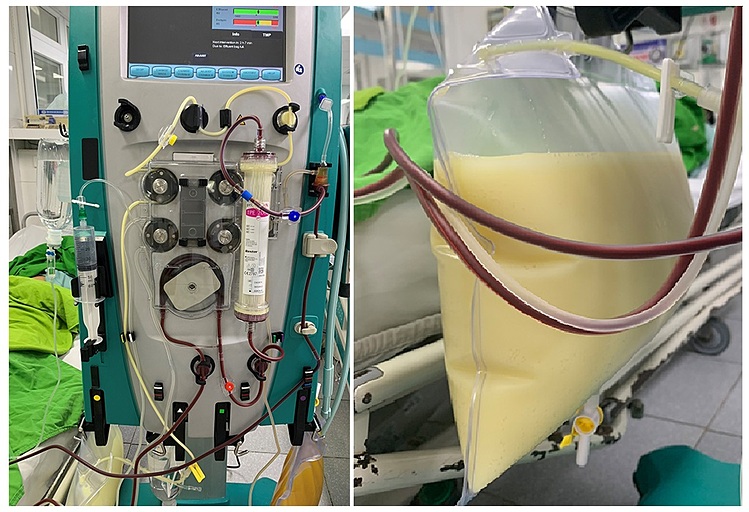On 7/7, Phu Tho General Hospital reported a patient who presented with abdominal pain and nausea. Tests revealed her triglyceride levels were 37 times higher than normal, and her pancreatic enzyme levels were 2.5 times higher.
A CT scan of the abdomen confirmed acute pancreatitis. The patient was diagnosed with hypertriglyceridemia-induced pancreatitis. Doctors treated her with plasmapheresis, intravenous fluids, insulin therapy, antibiotics, and secretion-reducing medication.
After five days, the patient stabilized, her abdominal pain subsided, and her pancreatic enzyme and triglyceride levels returned to normal.
 |
Milky white plasma due to high triglycerides and pancreatitis. Photo: Hospital provided |
High triglycerides, regardless of body weight, are an abnormal level of lipids in the blood. This includes an increase in LDL-C (bad cholesterol), triglycerides, or a decrease in HDL-C (good cholesterol). According to the World Health Organization (WHO), high triglycerides are linked to 48% of strokes and 56% of myocardial infarctions (heart attacks) globally.
Dr. Nguyen Manh Hung of the Intensive Care Unit - Toxicology Department, stated that hypertriglyceridemia-induced pancreatitis accounts for approximately 1-4% of acute pancreatitis cases. However, it carries a risk of severe progression, causing multiple organ damage and even death if not detected and treated promptly.
High triglycerides are often considered a "silent killer" due to their subtle progression and lack of clear symptoms. Many individuals discover their condition only after complications like pancreatitis, heart attack, or stroke have occurred. Notably, many with high triglycerides are not obese, leading them to neglect regular health checkups and resulting in late diagnoses.
Doctors recommend maintaining a healthy lifestyle: a balanced diet low in fat, rich in vegetables and fiber, and regular exercise. Avoiding excessive alcohol, tobacco, and other risk factors for pancreatic damage and lipid metabolism disorders is crucial. Regular health checkups one or two times a year, even when feeling healthy, are essential.
Thuy Quynh












